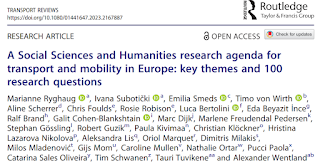Overlooked context? How culture, geography, and policy are treated in automated vehicle literature

Innovation races often distort rational decision-making. For example, is the robotaxi service model truly suitable for the European context, where taxis account for less than 1% of trips while public transport exceeds 20%? In other words, is the “Waymo model” universally applicable? In our new book chapter in Advances in Transport Policy and Planning (edited by Jan Anne Annema), co-authored with Andrea Lucia Hauslbauer and Chiara Vitrano, we examine the extent to which academic AV research accounts for contextual diversity, defined as the geographic, cultural, and policy factors that shape AV service deployment outcomes. Based on a systematic review of 26 influential peer-reviewed articles, we analyse both the empirical presence and the analytical role of these context factors. Our findings show that while geography and policy are frequently acknowledged, they are often treated as background conditions rather than as active analytical lenses. Culture is significantly underrepresented ...





